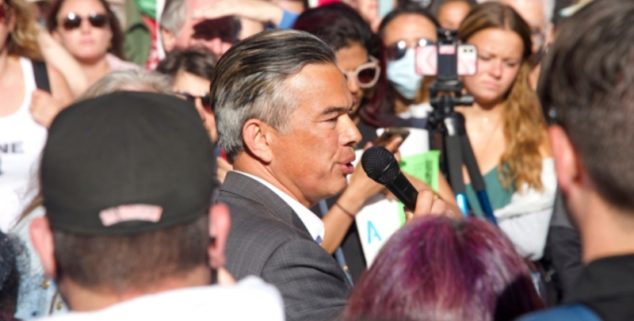Opinion
Can a No-Party-Preference candidate be elected state AG?
 State Attorney General Rob Bonta in San Francisco at a women's rights demonstration last week. <(Photo: Sheila Fitzgerald, via Shutterstock)
State Attorney General Rob Bonta in San Francisco at a women's rights demonstration last week. <(Photo: Sheila Fitzgerald, via Shutterstock)With the expected blow-out win of Gov. Gavin Newsom, whose re-election was almost assured when he demolished the ill-advised recall attempt last year, pundits and political reporters – always spoiling for a good fight and a close race — now seem to be searching the other seven races for statewide office to find one that might be even marginally competitive.
Much of the early focus is on the contest for attorney general. Appointed incumbent Rob Bonta is running to retain the job, and his chief opponent appears to be Sacramento District Attorney Anne Marie Schubert. Anything can happen in a campaign, but let’s take a good look at the history and math before anyone tries to will this into a hot race.
First, what has not happened in attorney general races since 1994 — yes, 28 years ago — is someone other than a Democrat being elected to the post, and in that case it was a Republican incumbent running for reelection. We now have our fifth-straight Democrat sitting in that office. So over six subsequent election cycles, whether concern about crime was higher or lower, California voters clearly have not been searching for an alternative to the Democrat running for attorney general.
There is no evidence from the previous election cycles in which no-party-preference (NPP) candidates were allowed that this designation confers an advantage.
During that period of time, the best chance of defeating a Democrat was in 2010, when popular three-term Los Angeles County district attorney Steve Cooley, a Republican, was paired against San Francisco D.A. Kamala Harris. Pundits and even many Democrats (myself included, truth to tell) gave Cooley an advantage over a minority woman (there had never been a woman elected attorney general in the state) from liberal San Francisco who was not only anti-death penalty, but had even refused to bring a death penalty charge against a cop killer.
It was by far the closest race of the eight statewide contests that year, finally decided three weeks after election day, but no cigar. Harris ultimately defeated Cooley, completing a now-routine Democratic sweep of all eight statewide constitutional offices.
But aha, pundits and Republicans say, Bonta, although the incumbent, was appointed to the position by Newsom, has never run statewide, and therefore must be considered potentially vulnerable to a challenge.
Aha, I say in response, the last race for attorney general in 2018 also involved an appointed incumbent, Xavier Becerra, who had previously represented one congressional district out of 53 and had never before run statewide. The Republican candidate who proceeded to the November runoff earned just 36.4 percent of the vote for his trouble, with first-time statewide candidate Becerra garnering an overwhelming 63.6 percent.
Shorn of that argument, the next case made is that lifelong Republican Schubert has chosen to run as a nonpartisan, so won’t have the scarlet letter R after her name in this overwhelmingly blue state.
Again, there is no evidence from the previous election cycles in which no-party-preference (NPP) candidates were allowed that this designation confers an advantage. In 2014, longtime Republican Dan Schnur ran for secretary of state as an NPP, arguing that as the chief administrator of elections, the position should be nonpartisan. In the primary, Schnur came in fourth, with only 9.2 percent of the vote, and didn’t make the runoff, which was between a Democrat and a Republican (the Democrat easily prevailed).
The only time an NPP candidate actually ended up in a fall statewide runoff, in 2018, also doesn’t provide proof that the “independent” status is an advantage.
In the race for state insurance commissioner, NPP Steve Poizner faced off against Democratic state senator Ricardo Lara. Unlike Lara, who was running statewide for the first time, the wealthy and self-financing Poizner had actually been elected to the same position in 2006 as a Republican (the last time a GOP candidate was elected statewide), served as insurance commissioner for one term, then ran in the Republican primary for governor in 2010.
Despite his previous high-profile service as commissioner, and having been on a statewide ballot three times before, Poizner was defeated by Lara in the run-off.
One other point: Our top-two primary system moves only two candidates forward into a fall run-off. It doesn’t take a mathematician to figure out that in any two-way race the winner has to earn an absolute majority of the vote. That means any run-off candidate facing a Democrat must clear at a minimum 50.1 percent. No Republican has come close to that in a statewide race (registered Republicans are only 24 percent of the electorate). In 2018, the five Republicans in statewide runoffs received a high of 38 percent and a low of 34.5. Nor did the only NPP candidate ever to make a runoff; Poizner got 47.1 percent that year. NPP voters represent just 23 percent of registered voters, hardly a strong base.
Will the attorney general’s race end up being a real contest? Maybe, but despite the wishful thinking and the hype, put me down as a skeptic given the history and the math.
—
Editor’s Note: Garry South is a veteran Democratic strategist who has advised four campaigns for governor and two for lieutenant governor in California.
Want to see more stories like this? Sign up for The Roundup, the free daily newsletter about California politics from the editors of Capitol Weekly. Stay up to date on the news you need to know.
Sign up below, then look for a confirmation email in your inbox.

Leave a Reply